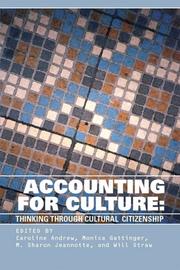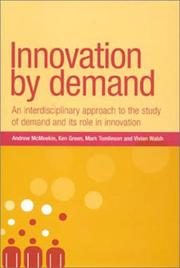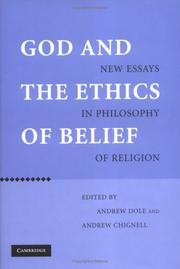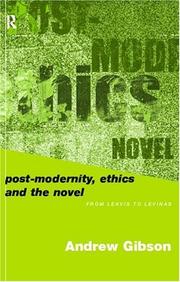| Listing 1 - 10 of 3773 | << page >> |
Sort by
|

ISBN: 1280690348 9786613667281 0776615335 0776627147 0776605968 Year: 2005 Publisher: Les Presses de l’Université d’Ottawa | University of Ottawa Press
Abstract | Keywords | Export | Availability | Bookmark
 Loading...
Loading...Choose an application
- Reference Manager
- EndNote
- RefWorks (Direct export to RefWorks)
Many scholars, practitioners, and policy-makers in the cultural sector argue that Canadian cultural policy is at a crossroads: that the environment for cultural policy-making has evolved substantially and that traditional rationales for state intervention no longer apply. The concept of cultural citizenship is a relative newcomer to the cultural policy landscape, and offers a potentially compelling alternative rationale for government intervention in the cultural sector. Likewise, the articulation and use of cultural indicators and of governance concepts are also new arrivals, emerging as potentially powerful tools for policy and program development. Accounting for Culture is a unique collection of essays from leading Canadian and international scholars that critically examines cultural citizenship, cultural indicators, and governance in the context of evolving cultural practices and cultural policy-making. It will be of great interest to scholars of cultural policy, communications, cultural studies, and public administration alike.
Canada -- Civilization -- 21st century. --- Canada -- Cultural policy. --- Canada -- Intellectual life -- 21st century -- Citizen participation. --- Canada -- Politique culturelle. --- Canada -- Vie intellectuelle -- 21e sieÌ€cle -- Participation des citoyens. --- Regions & Countries - Americas --- History & Archaeology --- Canada --- Cultural policy. --- Intellectual life --- Citizen participation. --- Civilization --- Politique culturelle. --- Vie intellectuelle --- Participation des citoyens. --- Civilisation --- Canada (Province) --- Province of Canada --- Dominion of Canada --- Ḳanadah --- Ḳanade --- Kanada (Dominion) --- Chanada --- كندا --- Канада --- Καναδάς --- Kanadas --- Republica de Canadá --- Dominio del Canadá --- Kanado --- کانادا --- Ceanada --- Yn Chanadey --- Chanadey --- 캐나다 --- Kʻaenada --- Kanakā --- קנדה --- カナダ --- Canadae --- Kanadaja --- 加拿大 --- קאנאדע --- Upper Canada --- Lower Canada --- Jianada --- Kaineḍā --- society --- culture --- citizenship --- cultural policy --- Nonfiction. --- Politics.
Book
ISBN: 1442662328 9781442662322 1442662549 144261286X 1442644788 Year: 2018 Publisher: Toronto : University of Toronto Press,
Abstract | Keywords | Export | Availability | Bookmark
 Loading...
Loading...Choose an application
- Reference Manager
- EndNote
- RefWorks (Direct export to RefWorks)
Molson. Redpath. Desjardins. Labatt. Massey. Eaton. These names are as much a part of our national identity as our hockey teams and our literature, but few of us know much about the people behind them - the individuals who have energized this country's economic life for over four centuries, and whose entrepreneurialism has shaped the face of Canadian business as we know it.This captivating collection of biographies profiles Canada's most prominent and innovative business people from the early 1600s through the first quarter of the twentieth century. Beginning with an accessible overview of the rise of entrepreneurialism in Canada, it features portraits of 61 individuals organized thematically. Here, readers will meet a variety of seminal characters: the merchants of the first trading posts and the commercial empire of the St. Lawrence; the industrialists of the Maritimes, Central Canada, and the West; the railway builders and urban developers; and everyone in between.Bringing to the fore new Dictionary of Canadian Biography research on the rise of Canadian entrepreneurialism - one of the least explored yet most important themes in our history - this book showcases Canada's long-running tradition of business innovation and growth.
Businesspeople --- Entrepreneurship --- History. --- Entrepreneur --- Intrapreneur --- Capitalism --- Business incubators --- History --- E-books
Book
ISBN: 019996758X 019026005X 9780199967582 0199323984 9780190260057 9780199846252 0199846251 9780199323982 Year: 2013 Publisher: Oxford, England ; New York : Oxford University Press,
Abstract | Keywords | Export | Availability | Bookmark
 Loading...
Loading...Choose an application
- Reference Manager
- EndNote
- RefWorks (Direct export to RefWorks)
Betting the Company: Complex Negotiation Strategies for Law and Business provides a thorough introduction to the concepts and tools required by lawyers and business people to successfully conduct a multi-faceted negotiation.

ISBN: 0719062675 0719082846 1847790526 1781700273 141759053X 9781417590537 9781847790521 9781781700273 1526137445 9780719062674 1847795528 Year: 2002 Publisher: Manchester ; New York : Manchester University Press : Distributed exclusively in the USA by Palgrave,
Abstract | Keywords | Export | Availability | Bookmark
 Loading...
Loading...Choose an application
- Reference Manager
- EndNote
- RefWorks (Direct export to RefWorks)
Sociologists and economists are increasingly interested in understanding the patterns and drivers of technological innovation. This book brings together a range of experts to study the role of demand and consumption in the innovative process, including case studies to illustrate the issues raised.
Economic order --- Economic production --- Consumption (Economics). --- Consumption (Economics) --- Demand (Economic theory). --- Diffusion of innovations. --- Supply and demand. --- Sociological aspects. --- Demand (Economic theory) --- Diffusion of innovations --- Supply and demand --- Demand and supply --- Industrial production --- Law of supply and demand --- Economics --- Competition --- Exchange --- Overproduction --- Prices --- Value --- Innovations, Diffusion of --- Acculturation --- Communication --- Culture diffusion --- Technological innovations --- Production (Economic theory) --- Consumer demand --- Consumer spending --- Consumerism --- Spending, Consumer --- Sociological aspects --- E-books --- African Americans. --- Industry, innovation and infrastructure. --- collective identity. --- consumption. --- demand. --- economic development. --- economic sociology. --- high-tech products. --- innovation. --- macro-structural. --- micro-individual.
Book
ISBN: 9780813169057 9780813169064 9780813169071 0813169062 0813169070 0813169054 081317726X 9780813177267 Year: 2019 Publisher: Lexington, Kentucky : University Press of Kentucky,
Abstract | Keywords | Export | Availability | Bookmark
 Loading...
Loading...Choose an application
- Reference Manager
- EndNote
- RefWorks (Direct export to RefWorks)
While domestic issues loom large in voters' minds during American presidential elections, matters of foreign policy have consistently shaped candidates and their campaigns. From the start of World War II through the collapse of the Soviet Union, presidential hopefuls needed to be perceived as credible global leaders in order to win elections--regardless of the situation at home--and voter behavior depended heavily on whether the nation was at war or peace. Yet there is little written about the importance of foreign policy in US presidential elections or the impact of electoral issues on the formation of foreign policy. In US Presidential Elections and Foreign Policy, a team of international scholars examines how the relationship between foreign policy and electoral politics evolved through the latter half of the twentieth century. Covering all presidential elections from 1940 to 1992--from debates over American entry into World War II to the aftermath of the Cold War--the contributors correct the conventional wisdom that domestic issues and the economy are always definitive. Together they demonstrate that, while international concerns were more important in some campaigns than others, foreign policy always matters and is often decisive. This illuminating commentary fills a significant gap in the literature on presidential and electoral politics, emphasizing that candidates' positions on global issues have a palpable impact on American foreign policy.
Political sociology --- International relations. Foreign policy --- anno 1900-1999 --- United States --- Presidents --- Presidency --- Heads of state --- Executive power --- Elections --- Foreign relations --- ABŞ --- ABSh --- Ameerika Ühendriigid --- America (Republic) --- Amerika Birlăshmish Shtatlary --- Amerika Birlăşmi Ştatları --- Amerika Birlăşmiş Ştatları --- Amerika ka Kelenyalen Jamanaw --- Amerika Qūrama Shtattary --- Amerika Qŭshma Shtatlari --- Amerika Qushma Shtattary --- Amerika (Republic) --- Amerikai Egyesült Államok --- Amerikanʹ Veĭtʹsėndi︠a︡vks Shtattnė --- Amerikări Pĕrleshu̇llĕ Shtatsem --- Amerikas Forenede Stater --- Amerikayi Miatsʻyal Nahangner --- Ameriketako Estatu Batuak --- Amirika Carékat --- AQSh --- Ar. ha-B. --- Arhab --- Artsot ha-Berit --- Artzois Ha'bris --- Bí-kok --- Ē.P.A. --- EE.UU. --- Egyesült Államok --- ĒPA --- Estados Unidos --- Estados Unidos da América do Norte --- Estados Unidos de América --- Estaos Xuníos --- Estaos Xuníos d'América --- Estatos Unitos --- Estatos Unitos d'America --- Estats Units d'Amèrica --- Ètats-Unis d'Amèrica --- États-Unis d'Amérique --- Fareyniḳṭe Shṭaṭn --- Feriene Steaten --- Feriene Steaten fan Amearika --- Forente stater --- FS --- Hēnomenai Politeiai Amerikēs --- Hēnōmenes Politeies tēs Amerikēs --- Hiwsisayin Amerikayi Miatsʻeal Tērutʻiwnkʻ --- Istadus Unidus --- Jungtinės Amerikos valstybės --- Mei guo --- Mei-kuo --- Meiguo --- Mî-koet --- Miatsʻyal Nahangner --- Miguk --- Na Stàitean Aonaichte --- NSA --- S.U.A. --- SAD --- Saharat ʻAmērikā --- SASht --- Severo-Amerikanskie Shtaty --- Severo-Amerikanskie Soedinennye Shtaty --- Si︠e︡vero-Amerikanskīe Soedinennye Shtaty --- Sjedinjene Američke Države --- Soedinennye Shtaty Ameriki --- Soedinennye Shtaty Severnoĭ Ameriki --- Soedinennye Shtaty Si︠e︡vernoĭ Ameriki --- Spojené obce severoamerické --- Spojené staty americké --- SShA --- Stadoù-Unanet Amerika --- Stáit Aontaithe Mheiriceá --- Stany Zjednoczone --- Stati Uniti --- Stati Uniti d'America --- Stâts Unîts --- Stâts Unîts di Americhe --- Steatyn Unnaneysit --- Steatyn Unnaneysit America --- SUA (Stati Uniti d'America) --- Sŭedineni amerikanski shtati --- Sŭedinenite shtati --- Tetã peteĩ reko Amérikagua --- U.S. --- U.S.A. --- United States of America --- Unol Daleithiau --- Unol Daleithiau America --- Unuiĝintaj Ŝtatoj de Ameriko --- US --- USA --- Usono --- Vaeinigte Staatn --- Vaeinigte Staatn vo Amerika --- Vereinigte Staaten --- Vereinigte Staaten von Amerika --- Verenigde State van Amerika --- Verenigde Staten --- VS --- VSA --- Wááshindoon Bikéyah Ałhidadiidzooígíí --- Wilāyāt al-Muttaḥidah --- Wilāyāt al-Muttaḥidah al-Amirīkīyah --- Wilāyāt al-Muttaḥidah al-Amrīkīyah --- Yhdysvallat --- Yunaeted Stet --- Yunaeted Stet blong Amerika --- ZDA --- Združene države Amerike --- Zʹi︠e︡dnani Derz︠h︡avy Ameryky --- Zjadnośone staty Ameriki --- Zluchanyi︠a︡ Shtaty Ameryki --- Zlucheni Derz︠h︡avy --- ZSA --- Η.Π.Α. --- Ηνωμένες Πολιτείες της Αμερικής --- Америка (Republic) --- Американь Вейтьсэндявкс Штаттнэ --- Америкӑри Пӗрлешӳллӗ Штатсем --- САЩ --- Съединените щати --- Злучаныя Штаты Амерыкі --- ولايات المتحدة --- ولايات المتّحدة الأمريكيّة --- ولايات المتحدة الامريكية --- 미국 --- Foreign relations administration. --- Decision making. --- États-Unis --- É.-U. --- ÉU

ISBN: 9780511499166 9780521850933 9780521118415 9780511145902 051114590X 9780511146923 0511146922 0521850932 0521850932 0511499167 0521118417 1107153832 1280431598 0511182112 0511300034 0511146345 Year: 2005 Publisher: New York : Cambridge University Press,
Abstract | Keywords | Export | Availability | Bookmark
 Loading...
Loading...Choose an application
- Reference Manager
- EndNote
- RefWorks (Direct export to RefWorks)
Philosophy of religion in the Anglo-American tradition experienced a 'rebirth' following the 1955 publication of New Essays in Philosophical Theology (eds. Antony Flew and Alisdair MacIntyre). Fifty years later, this volume of essays offers a sampling of the best work in what is now a very active field, written by some of its most prominent members. A substantial introduction sketches the developments of the last half-century, while also describing the 'ethics of belief' debate in epistemology and showing how it connects to explicitly religious concerns and to the topics of the individual contributions. These topics include: the relationship between God and the natural laws; the metaphysics of bodily resurrection; the role of appeal to 'mystery' in the religious life; the justification of both theistic belief generally and more specific doctrinal beliefs; and the social-political aspects of religious faith and practice.
Christianity --- Philosophy --- Belief and doubt. --- Conviction --- Doubt --- Consciousness --- Credulity --- Emotions --- Knowledge, Theory of --- Psychology --- Religion --- Will --- Agnosticism --- Rationalism --- Skepticism --- Philosophy. --- Arts and Humanities
Book
ISBN: 1912273934 9781912273928 1912273926 9781912273935 Year: 2020 Publisher: Legal Action Group
Abstract | Keywords | Export | Availability | Bookmark
 Loading...
Loading...Choose an application
- Reference Manager
- EndNote
- RefWorks (Direct export to RefWorks)
Book
Abstract | Keywords | Export | Availability | Bookmark
 Loading...
Loading...Choose an application
- Reference Manager
- EndNote
- RefWorks (Direct export to RefWorks)
From the conflict in Syria to the crisis in Ukraine, Russia continues to dominate the headlines. Yet the political realities of contemporary Russia are poorly understood by Western observers and policy-makers. Andrew Monaghan explains the importance of 'getting Russia right'. Exploring in detail the relationship between the West and Russia, he charts the development of relations and investigates the causes of the increasingly obvious sense of strategic dissonance. He also considers the evolution in Russian domestic politics, introducing influential current figures and those who are forming the leadership and opposition of the future. By delving into the depths of difficult questions such as the causes of the Ukraine crisis or the political protests surrounding the 2011–12 elections, the book offers a dynamic model for understanding this most fascinating and elusive of countries.
Russia (Federation) --- Russia (Federation --- Politics and government --- History --- russia --- the russian question --- putin --- new cold war --- ukraine --- russian election protests

ISBN: 0415198968 041519895X 1134638655 1280335084 0203007182 0203158652 9780203158654 9780203007181 9780415198950 9780415198967 1134638647 Year: 1999 Publisher: London ; New York : Routledge,
Abstract | Keywords | Export | Availability | Bookmark
 Loading...
Loading...Choose an application
- Reference Manager
- EndNote
- RefWorks (Direct export to RefWorks)
In Postmodernity, Ethics and the Novel Andrew Gibson sets out to demonstrate that postmodern theory has actually made possible an ethical discourse around fiction. Each chapter elaborates and discusses a particular aspect of Levinas' thought and raises questions for that thought and its bearing on the novel. It also contains detailed analyses of particular texts. Part of the book's originality is its concentration on a range of modernist and postmodern novels which have seldom if ever served as the basis for a larger ethical theory of fiction. Postmodernity, Ethics and the
Fiction --- Comparative literature --- anno 1900-1999 --- Ethics in literature --- Ethiek in de literatuur --- Ethique dans la littérature --- Post-modernisme (Littérature) --- Postmodernism (Literature) --- Postmodernisme (Literatuur) --- Postmodernisme (Littérature) --- 1 LEVINAS, EMMANUEL --- 82.015.9 --- 820-3 --- Filosofie. Psychologie--LEVINAS, EMMANUEL --- Literaire stromingen: postmodernisme --- Engelse literatuur: proza --- American fiction --- Criticism --- Didactic fiction --- English fiction --- Ethics in literature. --- French fiction --- History and criticism --- Theory, etc. --- History --- 820-3 Engelse literatuur: proza --- 82.015.9 Literaire stromingen: postmodernisme --- 1 LEVINAS, EMMANUEL Filosofie. Psychologie--LEVINAS, EMMANUEL --- Theory, etc --- Literary movements --- Literature, Modern --- Modernism (Literature) --- Post-postmodernism (Literature) --- French literature --- English literature --- Evaluation of literature --- Literary criticism --- Literature --- Rhetoric --- Aesthetics --- American literature --- History and criticism&delete& --- Technique --- Evaluation --- 20th century --- Postmodernisme et littérature --- Roman anglais --- Roman américain --- Roman français --- Morale --- 20e siècle --- Histoire et critique --- Théorie, etc. --- Dans la littérature
Book
ISBN: 1280360658 9786610360659 1402039824 Year: 2006 Volume: v. 18 Publisher: Dordrecht : Springer,
Abstract | Keywords | Export | Availability | Bookmark
 Loading...
Loading...Choose an application
- Reference Manager
- EndNote
- RefWorks (Direct export to RefWorks)
What makes an event count as an action? Typical answers appeal to the way in which the event was produced: e.g., perhaps an arm movement is an action when caused by mental states (in particular ways), but not when caused in other ways. Andrew Sneddon argues that this type of answer, which he calls "productionism", is methodologically and substantially mistaken. In particular, productionist answers to this question tend to be either individualistic or foundationalist, or both, without explicit defence. Instead, Sneddon offers an externalist, anti-foundationalist account of what makes an event count as an action, which he calls neo-ascriptivism, after the work of H.L.A. Hart. Specifically, Sneddon argues that our practices of attributing moral responsibility to each other are at least partly constitutive of events as actions.
Act (Philosophy) --- Responsibility. --- Events (Philosophy) --- Philosophy --- Accountability --- Moral responsibility --- Obligation --- Ethics --- Supererogation --- Action (Philosophy) --- Agent (Philosophy) --- Metaphysics. --- Ethics. --- Philosophy of mind. --- Social sciences --- Philosophy of Mind. --- Philosophy of the Social Sciences. --- Philosophy. --- Social philosophy --- Social theory --- Mind, Philosophy of --- Mind, Theory of --- Theory of mind --- Cognitive science --- Metaphysics --- Philosophical anthropology --- Deontology --- Ethics, Primitive --- Ethology --- Moral philosophy --- Morality --- Morals --- Philosophy, Moral --- Science, Moral --- Values --- God --- Ontology --- Philosophy of mind --- Philosophy and social sciences. --- Social sciences and philosophy
| Listing 1 - 10 of 3773 | << page >> |
Sort by
|

 Search
Search Feedback
Feedback About UniCat
About UniCat  Help
Help News
News